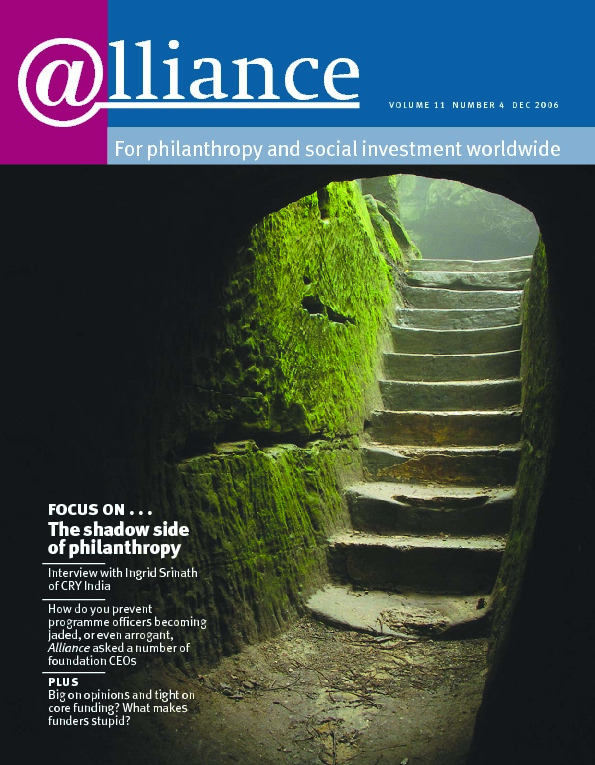In his article in the September issue of Alliance, Bruce Sievers highlights a number of important questions that journalists did not ask when reporting on Warren Buffett’s donation to the Gates Foundation. This is a response to those questions related to decision-making in foundations and the issues of governance, accountability and transparency.
A number of recently coined terms – ‘billanthropist’, ‘philanthrocapitalism’, ‘philanthropic investor’, etc – reflect a trend associated with a new generation of philanthropists. Their philanthropy is increasingly donor-driven; they come from the business world, adopt management-oriented approaches, expect substantial social return, and display considerable personal commitment.
These new players are tackling critical global issues that in the past were dealt with mainly by multilateral institutions and governments; they are forging links between the non-profit and for-profit sector, politics, science, research and so on. As a result, they are subject to higher expectations and more stringent demands. The potential for being attacked for lack of transparency, mismanagement, exploitation of tax privileges, or questionable foundation policy should not be underestimated. A scandal would negatively affect the entire sector. It could result in restrictive legislation, such as changing foundations’ tax treatment or regulation of the liberal conditions for foundations concerning governance, accountability or grantmaking procedures.
Another equally important caution is necessary. The current trend towards donor-controlled philanthropy, in which a small group of people make decisions, is unlikely to achieve lasting social change. To successfully manoeuvre the levers of change requires a multi-stakeholder approach.
Foundations aren’t subject to market pressure. What they have to do, however, is meet the expectations of a very broad range of stakeholders, which include beneficiaries, governmental and non-governmental organizations, the general public, the media and other foundations. They must also balance these against the very different demands of internal stakeholders, such as the board of trustees, management, staff and internal auditors. This is not only essential to their operation, it is crucial to their effectiveness.
Greater efficiency, effectiveness and lasting social returns are dependent both on the interplay of these stakeholders and on the voluntary adoption of principles for foundation governance, accountability and transparency that take sufficient account of them.
Finally, the multi-stakeholder approach is one important way of safeguarding that public confidence which is necessary to the functioning both of individual organizations and of the sector itself.
What needs to be done to minimize the risk of losing this confidence, especially in donor-controlled philanthropy where the risk is perceived to be greater? If not specified in the founding charter and/or by the donor, the board of trustees must set a transparent, formal process for the election, composition and remuneration of trustees and for the assessment of their performance. The role played by committees (such as audit or governance committees) should also be highlighted. They guarantee efficient management and constitute internal mechanisms for risk management and control.
More attention should be paid to appointing independent directors to the boards of donor-controlled foundations. Their value in selecting grants, and in ensuring independent governance audits and evaluation, is great. External stakeholders must also be involved in the process of bringing in external voices.
What we are pleading for, then, is for donors and foundation representatives to carefully examine the interdependency of foundation governance, accountability and transparency, and to consider the multi-stakeholder approach. The sustainability of individual foundations and of the sector is at issue.
Philanthropists have a responsibility to work towards resolving social issues and to promote the positive development of the sector so that it becomes increasingly effective. One of the things they must do in this respect is to safeguard public trust in themselves and their activities.
Luc Tayart de Borms Managing Director, King Baudouin Foundation and Linda Zurkinden-Erismann Partner StiftungsZentrum.ch


Comments (0)